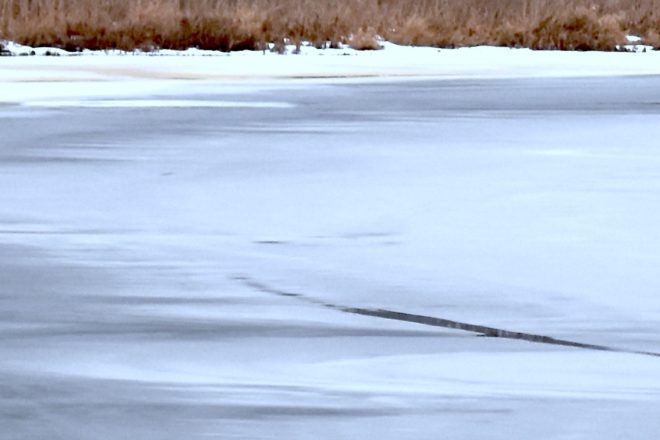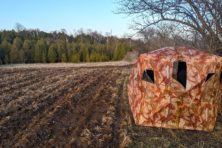WILD THINGS: Thaw Extends into February
- Share
- Tweet
- Pin
- Share

For the second straight winter, access to deep-water ice fishing on Green Bay doesn’t look like it’s going to happen.
Even if a predicted cold snap returns mid-month, it’ll almost certainly be too little, too late for anything outside of the more protected areas like bays, harbors and marinas.
Even those spots – think Sawyer Harbor, Little Sturgeon and downtown Sturgeon Bay, for example – may not be safe to fish.
Two weeks of daytime highs above freezing have taken a toll in areas where there was enough ice for anglers to venture out, and the long-term forecast shows an even warmer stretch through Feb. 11.
The Fox River at DePere was shedding its ice earlier this week, and other Lake Michigan tributaries won’t be far behind.
If the winds allow, you might even see a few small boat trollers getting out along the lakeshore this month to try to tangle with brown and lake trout.
As always, whether trying the ice or open water, safety should be your priority. No fish is worth an accident, or finding yourself stranded on a floating sheet of ice.
Until things either harden up or allow for open-water casting or trolling, it might be better to pick up your catch of the day at the local fish market.
Shooting Sports
Dan Forster of the Archery Trade Association wrote an opinion piece recently asking if our collective hunting and shooting community is still relevant in today’s society.
Hunting participation – as a percent of the total population – has declined significantly over the past several decades. And even though participation in organized shooting sports has grown, Forster asks, “is our fraternity, our vocation, and privilege at risk?”
He noted that support for hunting and shooting participation across the United States remains strong. According to a recent survey conducted by Responsive Management, 77 % of Americans approve of legal hunting. Approval of recreational shooting was reported at 78 % favorable.
According to the 2022 National Survey of Fishing, Hunting, and Wildlife-Associated Recreation, 14 million people (16 years and older) participated in hunting, 47+ million people participated in target shooting, and 19+ million people participated in archery.
License fees and federal excise taxes collected from manufacturers of ammunition, firearms, and archery equipment fund projects that restore, conserve, manage and enhance wild birds and mammals and their habitats. These funds can also be used to support access for wildlife-related recreation, hunter education, and the construction and operations of target ranges.
Clean Bird Feeders
The current meltdown offers a good opportunity to clean bird feeders and sweep or rake the ground underneath to remove as many droppings and empty sunflower hulls as possible.
Salmonella, E. coli and other bacteria along with viruses, parasites and fungal diseases can be passed by birds at feeders that don’t get cleaned regularly.
Always use fresh seed, purchased recently. Discard old seed. Feeders made from non-porous material like plastic, ceramic, and metal are less likely than wood to harbor bacteria and diseases.
To clean feeders, rinse with warm, soapy water and dunk in a solution of 3 oz. of chlorine bleach per gallon of water.
Clean up old seed hulls and waste below the feeders by raking, shoveling, or sweeping material and discarding in the trash, and consider spreading your feeding over several areas so birds aren’t congregated in one spot.
Muskies and Walleyes
If you’d like to learn more about Green Bay perch, pike, muskies and walleyes, a pair of public meetings Feb. 7 and Feb. 12 should be on your radar.
Department of Natural Resources fisheries staff are hosting informational meetings from 6-8 pm, with a Zoom option.
Fisheries biologist Jason Breeggemann is presenting walleye and muskie management at the Green Bay DNR Service Center Feb. 7. Fellow biologist Tammy Paoli will be giving the northern pike and yellow perch talk Feb. 12 at the Peshtigo DNR Field Office.
More information can be found on the DNR’s meetings and hearings calendar at https://dnr.wisconsin.gov/calendar.
Weekly Water Levels
With a 33-inch drop since the record monthly high four years ago, Lake Michigan water levels are now estimated to be only about four inches above the 100-year average.
Levels have dropped about an inch in the past month, and are expected to fall another inch in January. Despite the fall since 2020, water levels are still about 33 inches above the all-time monthly low, set in 2013.
February Hunting
The extended bow and crossbow deer hunting season in Brown, Door and Kewaunee counties ended Jan. 31. Hunts still open include fox, coyote, gray and fox squirrel, and cottontail rabbit.



